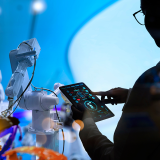In 2024, Eurofound continues its research on the impact of digitalisation and the transition to a climate-neutral economy on working life.
Various research strands linked with the digital and green transitions come to completion. This includes research into the impact of new developments in human–machine interaction on work organisation and working conditions. Research concludes on the impact of changes caused by the twin transitions at the sectoral level, focusing on the transformation of business activities, occupational and skill profiles, work organisation and working conditions. And analysis wraps up on the roles, opportunities and challenges of policy actors in the just transition, examining the design and implementation of Just Transition policies at the regional level, their mechanisms and the actors involved.
Research continues on the impact of the green and digital transitions on the labour market and labour market actors with a project to explore company restructuring approaches and their ongoing adaptation strategies. Further research takes place on the socioeconomic impact of the transition to a carbon-neutral economy, monitoring the employment and social dimension of the green transition.
New research focuses on how managers’ roles and functions are impacted by the increase in telework and the shift towards more hybrid working in terms of challenges and opportunities.
The ongoing monitoring of the developments in the platform economy continues through Eurofound’s regularly updated web repository. Building on previous studies on platform work and the ongoing monitoring of policies and measures with regard to platform work through the web repository, new research focuses on the working conditions of online platform workers. This work aims to explore the characteristics of online platform workers and how they fare in relation to contractual arrangements and job quality, including pay, work intensity, working time, occupational health and safety, social environment and career prospects. It also explores the career goals of platform workers.




































